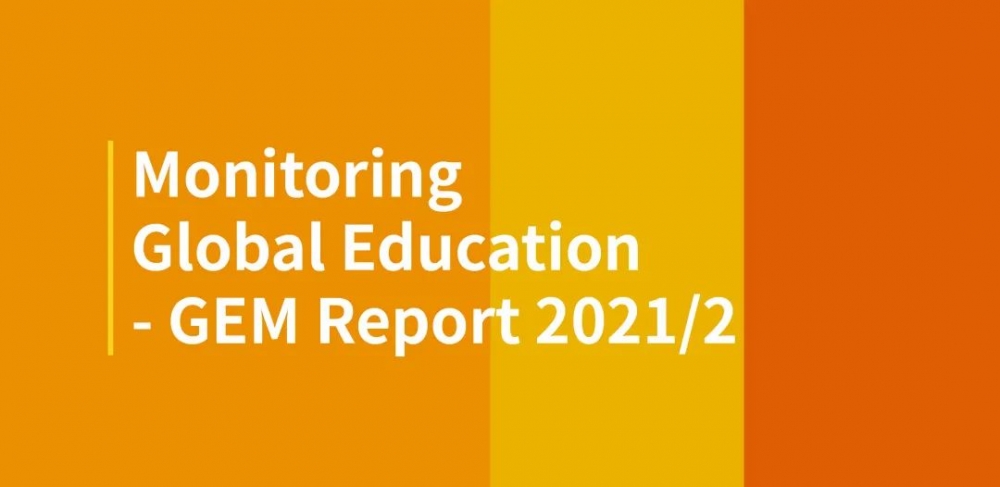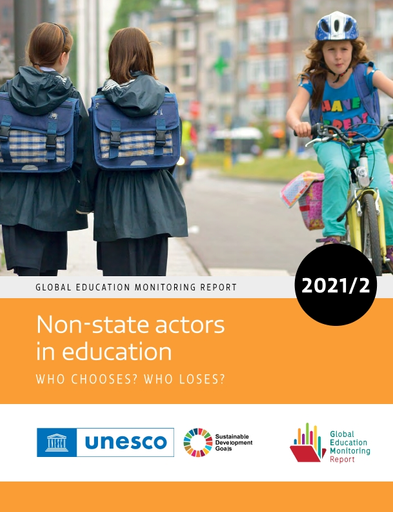
本文转载自:“UNESCO ICHEI”公众号

Established in 2002, the GEM Report is an editorially independent report hosted and published by UNESCO. This article is contributed by the GEM Report team, discussing non-state actors' role in skills development systems, particularly for technical and vocational education and training. Both committed to the fourth Sustainable Development Goal (SDG 4) on education, GEM Report and UNESCO-ICHEI are initiating collaborations on knowledge sharing and information exchange to distribute global best practices and professional reviews to support the fulfillment of inclusive and equitable quality education.
✦
作为联合国教科文组织系统内影响力最大的刊物之一,成立于2002年的《全球教育监测报告(Global Education Monitoring Report; GEM Report)》秉持着独立编辑、独立发行的原则,每年选取一个议题,对可持续发展目标4的进程进行监测与评估。本文为联合国教科文组织《全球教育监测报告》小组向联合国教科文组织高等教育创新中心(下称“创新中心”)的特别供稿;文章基于2021/2年度的《全球教育监测报告》,简要分析了职业教育中的非国家行为体以及其实际贡献。日后,创新中心仍将不定期与《全球教育监测报告》开展知识共享方面的特别合作,敬请各位读者关注。
✦
✦

Autor: Ms. Francesca Endrizzi
作者:Francesca Endrizzi女士
Professional Officer at
Global Education Monitoring Report
《全球教育监测报告》研究类别专业官员
Autor: Ms. Pooja Gianchandani
作者:Pooja Gianchandani女士
Programme Expert at UNESCO-UNEVOC (Expert on loan from GIZ)
联合国教科文组织职业技术教育与培训国际中心(UNESCO-UNEVOC)项目专家(德国国际合作研究所借调专家)
Non-state actors are involved in all aspects of education. But for some levels of education, their presence is more evident and even necessary. Technical and vocational education and training (TVET) is commonly associated with private and economic stakeholders. Both formal and informal TVET are co-dependent on various private and non-state actors’ involvement for quality, effectiveness and relevance of training. Where on- and in-the-job practical learning is an inherent feature of training provision, employers’ contributions to its design and financial sustainability are becoming increasingly important and desired.
非国家行为体参与了教育的方方面面。但对于某些层次的教育来说,非国家行为体的作用更为突出,甚至必不可少。其中,职业技术教育和培训(TVET)通常与私人和经济利益相关方息息相关。职业技术教育和培训无论正规与否,都要依赖各种私人和非国家行为体的参与来保证其质量、有效性和相关性。鉴于在职实践性学习(on- and in-the-job practical learning)是培训的固有特点,雇主对培训设计的投入和建设培训财务可持续性的行动正变得越来越重要。
As part of its mandate to monitor and report on SDG 4, the 2021/2 Global Education Monitoring Report on non-state actors in education reviews a wide range of stakeholders and their activities across all levels of education, dedicating a thematic chapter to technical, vocational and adult education. The report’s call – Who chooses? Who loses? – invites policymakers to evaluate the potentials and limitations of non-state engagement in the provision, regulations, governance and financing across all education levels from an equity and quality perspective. Chapter 8, in particular, examines non-state involvement in the design, delivery, and funding for technical, vocational and adult education. It provides insights on challenges as well as reflections on improving public and private sector cooperation for TVET.
《2021/2年全球教育监测报告》(2021/2 Global Education Monitoring Report)的任务是监测并汇报SDG 4(联合国可持续发展目标4:优质教育)的进展情况。作为这项任务的一部分,该报告回顾了广大利益相关方的情况及其在各层次教育中的活动,形成了一个关于职业技术教育和成人教育的专题章节——“谁做出选择?谁遭受损失?”。本章节呼吁政策制定者从公平和质量的角度出发,评估非国家行为体在各层次教育的提供、管理、治理和筹资方面的潜力和局限。其中第八章特别研究了非国家行为体参与职业技术教育和成人教育的设计、提供和供资的情况。该章节分享了对挑战的见解,并且对改进公共和私营部门在职业技术教育和培训中的合作进行了反思。

cr. Joris Vens/Super Formosa Photography
Initial TVET is mostly public but non-state actors have helped expand its provision in partnership with the state or through autonomous initiatives. In consolidated public TVET systems, they have ensured training responsiveness to changing labour and economic demands, also through provision-oriented public–private partnerships. In emerging markets, private providers have complemented vocational education systems and even substituted for filling skills gaps, such as in Tanzania.
职业技术教育和培训最初大多由政府提供,但非国家行为体通过与国家合作或自发参与扩大了其提供者的范围。在完成了整合的公共职业技术教育和培训系统中,非国家行为体通过以扩大供应为目标的公私合作伙伴关系,使培训能适应不断变化的劳动力和经济需求。在新兴市场国家,例如坦桑尼亚,私营培训供应商完善了职业教育系统,甚至填补了技能缺口。
Yet, non-state actors may obstruct or encourage equity in TVET. In richer countries, enterprises, which make the final selection of apprentices, may contribute to perpetuating discrimination towards specific groups of students, particularly those with immigrant backgrounds. In poorer countries, tight entry requirements and inadequate provision mean the few places in formal public TVET tend to be taken by urban, relatively well-off youth, as it occurs in South Asia. Non-governmental and civil society organizations have conversely set up training systems reaching out to the most marginalized.
然而,非国家行为体可能会对职业技术教育和培训的公平性带来或正面或负面的影响。在较富裕国家,由于实习期人员的去留最终由企业决定,对特定学生群体、特别是有移民背景的学生群体的歧视可能会加剧。在较贫困国家,由于门槛较高,供应匮乏,正规的职业技术教育和培训名额稀少,往往被相对富裕的城市青年占据;一些南亚国家的情况便是如此。然而,非政府组织和民间社会组织也建立了培训系统,向最边缘化的群体伸出援助之手。
Continuing skills development is mostly provided by private employers. In Europe, employer-sponsored job-related training increased between 2007 and 2016, reaching around 85% of non-formal job-related training. Employers interviewed across six countries within the World Bank's STEP Skills Measurement Programme also reported preferring on-the-job training over external programmes provided by formal public or private providers.
持续的技能培养大多由私人雇主提供。在欧洲,雇主出资提供的工作相关培训在2007年至2016年间增加到了工作相关非正式培训的85%左右。世界银行(World Bank)的STEP技能测量项目(STEP Skills Measurement Programme)报告称,有六个国家的受访雇主更青睐在职培训,而不是由正规的公共或私人机构提供的外部培训。
While private businesses continue providing and adjusting knowledge and skills in the labour market, continuing TVET fails to reach everyone. In low-income countries, only one in four enterprises provides training. Household and small firms are less likely to offer training than bigger enterprises, and entry educational attainment is still one of the most influential determinants of continuing learning.
虽然私营企业仍在提供并调整劳动力市场中的知识和技能,但持续的职业技术教育和培训却未能惠及所有人。在低收入国家,只有四分之一的企业提供培训。与大企业相比,家庭作坊和小公司提供培训的几率更低,而基础教育完成情况仍是雇员能否参与继续教育的决定性因素之一。
Quality is also at stake if quality assurance mechanisms are not fully implemented. In Bangladesh, only one in four non-state institutions has recognized the national qualification framework as a skills development model. In Uganda, only one in four private training providers registered and was thus subject to the country’s quality assurance mechanism, as the process was considered too complex.
如果无法充分实施质量保障机制,质量将难以得到保证。在孟加拉国,每四个非国有机构中只有一个将国家职业资格框架作为雇员的技能发展路径。在乌干达,由于注册过程被认为过于复杂,只有四分之一的私人培训机构完成了国家质量保障机制的注册并受该机制约束。

Currently, less than 2% of firms' total labour cost in Europe is spent on training
目前,欧洲用于培训的费用仅占企业总劳动成本的不到2%。
Despite the substantial engagement of non-state actors in skills development, funding remains below optimal level. Training represents less than 2% of firms’ total labour cost in Europe. Targeted incentives, for example through levy-grant programmes, remain consistently lower than the incentive to draw required skills directly from the labour market. Governments also encourage individuals to take part in training by covering direct or indirect costs. In Singapore, over half a million students have benefited from a US$365 per student credit to be spent on skills and training participation in the resident workforce.
尽管非国家行为体大量参与技能培养体系,用于技能培养的资金仍然低于最优水平。在欧洲,培训成本仅占企业总劳动力成本的不到2%。比起采纳有针对性的激励政策,例如税收补贴计划,雇主更宁愿直接雇佣已具备所需技能的人才。然而,各国政府还通过支付直接或间接费用来鼓励个人参加培训。在新加坡,每位学生可获得365美元贷款,用于获取当地劳动力需具备的技能和培训,至今已有逾50万名学生受益。
A more extensive overview of the findings on the thematic chapter on technical, vocational and adult education from the 2021/2 Global Education Monitoring Report - Who chooses? Who loses? will be presented and discussed during a joint event co-organized by UNESCO-UNEVOC and the GEM Report team in June 2022. For more information on the event, follow updates on the TVET Forum and the GEM Report blog.
联合国教科文组织职业技术教育与培训国际中心和全球教育监测报告小组将于2022年6月共同举办一场活动,届时将就《2021/2年全球教育监测报告》中的职业技术教育和成人教育专题章节——“谁做出选择?谁遭受损失?”作出更详细的阐述。更多信息,请关注职业技术教育和培训论坛和全球教育监测报告博客。
Download the full report and the summary from the Global Education Monitoring Report website.
如需下载报告全文及摘要,请访问全球教育监测报告官方网站。
Text | GEM Report
Picture | GEM Report
Editing | LU Yingfei
Proofreading | HUANG Chen
文字 | 《全球教育监测报告》小组
图片 | 《全球教育监测报告》小组
编辑 | 陆盈斐
审核| 黄辰






